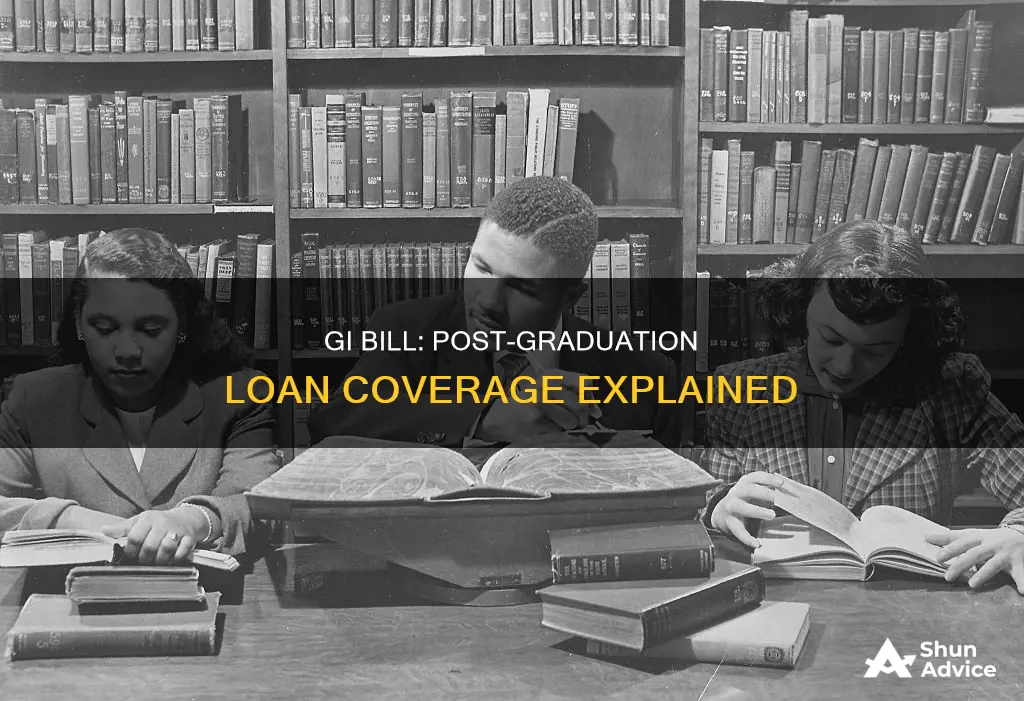
The Post-9/11 GI Bill provides educational benefits for military service members and veterans, including tuition coverage and financial assistance for up to 36 months. While the GI Bill can help cover a significant portion of expenses, it may not always be sufficient to cover all college costs. In such cases, individuals may consider taking out student loans to bridge the financial gap. Federal student loans are generally recommended over private loans due to lower interest rates and better borrower protections. Additionally, the military offers loan repayment programs like the Student Loan Repayment Program and Public Service Loan Forgiveness for eligible service members.
What You'll Learn

The GI Bill covers tuition and fees at public colleges and universities
The Post-9/11 GI Bill, or Chapter 33, provides education benefits to veterans who have served at least 36 months of active duty after September 10, 2001. The bill covers the full cost of tuition and fees for public, in-state colleges and universities, and provides a monthly housing allowance, money for books and supplies, and relocation assistance.
The GI Bill can be used strategically to cover a significant portion, if not all, of the expenses associated with degree programs. It is beneficial to fill out the Free Application for Federal Student Aid (FAFSA) before each school year, as GI benefits won't count as income on the FAFSA, which may help you qualify for additional federal financial aid. The Yellow Ribbon Program can also help cover the gap between GI Bill benefits and out-of-state or graduate tuition, or costs at private institutions.
It is important to note that the GI Bill benefits have an expiration date of 15 years after your last separation date from active service if your service ended before January 1, 2013. However, if your service ended on or after this date, your benefits will not expire thanks to the Forever GI Bill.
If your educational expenses exceed the coverage provided by the GI Bill, you may need to consider taking out student loans. Federal student loans, funded by the U.S. Department of Education, typically offer lower interest rates, more borrower protections, and forgiveness options compared to private student loans from banks or online lenders.
Co-op Bridging Loans: What You Need to Know
You may want to see also

The GI Bill covers a portion of housing expenses
The Post-9/11 GI Bill (PGIB) or Chapter 33, provides financial support for veterans who have served on active duty after September 10, 2001. This bill covers a portion of housing expenses, also known as the Monthly Housing Allowance (MHA) or Basic Allowance for Housing (BAH). The MHA is a benefit provided by the Department of Veterans Affairs, while the BAH is offered by the Department of Defense.
The amount of housing allowance received is based on the cost of living in the area where the school is located. The VA calculates the MHA using the Department of Defense's BAH rates for an E-5 with dependents, based on the zip code of the training location. The MHA is prorated for the days you attend class, and the rate is updated annually. For instance, the 2024 rates are effective from August 1, 2024, to July 31, 2025.
To be eligible for the MHA, you must be enrolled in school for more than half of the time. Additionally, your rate of pursuit, which is determined by the number of credits you are taking each term or the clock hours you attend each week, must be over 50%. The MHA is also available for online-only classes, but it will be based on the national housing allowance average, with a maximum payment of $1,177.50 per month.
It is important to note that the GI Bill benefits have an expiration date. If your service ended before January 1, 2013, your benefits will expire 15 years after your last separation date from active service. However, if your service ended on or after January 1, 2013, your benefits will not expire, thanks to the Forever GI Bill.
If the GI Bill benefits do not cover all your expenses, you may consider taking out student loans. You can choose between federal student loans, which generally have lower interest rates and more borrower protections, or private student loans from banks or online lenders. Additionally, the Yellow Ribbon Program can help cover the gap between the Post-9/11 GI Bill benefits and out-of-state or private school tuition.
Denver Botanic Gardens: Wheelchair Accessibility and Loaner Options
You may want to see also

The GI Bill covers books and supplies
The Post-9/11 GI Bill (PGIB) or Chapter 33, provides financial support for school or training expenses to those who have served in active duty after September 10, 2001. The bill covers tuition fees, housing, relocation, and books and supplies.
Recipients of the Post-9/11 GI Bill are eligible to receive up to $1,000 for books and supplies per academic year. This applies to active-duty veterans, reservists, and guard members with qualifying active-duty service, as well as their dependents. The $1000 annual stipend is equal to $41.67 per credit hour for a maximum of 12 hours per semester. For each semester of full-time enrolment, recipients will receive $500. The money is paid directly to the recipient at the start of each semester and can be spent at their discretion, with no requirement for receipts or tax.
If enrolled for less than a full year or as a part-time student, the recipient will receive a prorated portion of the $1000 annual maximum. The books and supplies stipend is payable to all Post-9/11 GI Bill recipients, regardless of their enrolment status as a full-time or part-time student.
The Post-9/11 GI Bill covers 36 months of benefits, which can be used to take as many classes as possible within that timeframe. To make the most of these benefits, it is recommended to take summer classes, select a major early on, and enrol in online courses to save on additional costs such as transportation and childcare.
If the GI Bill benefits do not cover all school costs, individuals may consider taking out student loans, either federal or private. Federal loans typically offer lower interest rates and more borrower protections, so they are generally the preferred option. However, depending on one's credit score, a private loan may offer a lower rate than a federal loan.
Economic Injury Loan: To Repay or Not?
You may want to see also

The GI Bill covers relocation costs
The GI Bill does not cover loans after you have graduated. However, the Post-9/11 GI Bill (PGIB) or Chapter 33, provides financial support for veterans' education and training. This includes covering the cost of tuition, fees, housing, books, supplies, and relocation.
Eligibility
To be eligible for the Post-9/11 GI Bill, individuals must have served on active duty after September 10, 2001, and have been discharged due to a service-connected disability. Additionally, they must have served at least 36 months of active duty or have a qualifying period of active duty. Those who have served at least 90 days on active duty, either all at once or with breaks in service, on or after September 11, 2001, may also be eligible.
Relocation Costs
The Post-9/11 GI Bill includes a provision for relocation costs, specifically for students who need to move from a rural area to attend college. This benefit is designed to help cover the cost of relocating to a location closer to the educational institution. To qualify for this one-time payment, individuals must reside in a county with six or fewer people per square mile and either move at least 500 miles to attend school or have no option but to travel by plane to get to their school due to a lack of land-based transportation options.
The amount of the one-time relocation benefit payment is $500, which can help offset the costs associated with moving, such as transportation, packing materials, and temporary housing. This benefit is available to eligible veterans who meet the residency and distance criteria, making it easier for them to access educational opportunities that may not be available in their local area.
Additional Benefits
In addition to the relocation benefit, the Post-9/11 GI Bill offers a range of other advantages. These include tuition assistance, covering the full cost of in-state tuition and fees at public colleges, universities, and approved institutes of higher learning in the U.S. The bill also provides a monthly housing allowance, which is based on the cost of living in the area where the school is located. This allowance can range from an average of $1,934.80 to over $2,700 per month, depending on the location.
Furthermore, the Post-9/11 GI Bill provides funding for books and supplies, with an annual maximum stipend of $1,000 per school year. For those attending private or foreign schools, there is a cap on tuition assistance, with a national maximum of $27,120.05 for the 2023-24 academic year, which is updated annually.
It is important to note that the Post-9/11 GI Bill benefits do not cover all education expenses, and individuals may still need to pay for some costs out of pocket. Additionally, these benefits have a time limit for usage, with those whose service ended before January 1, 2013, having 15 years after their last separation date to utilize their benefits, while those whose service ended on or after January 1, 2013, have no deadline thanks to the Forever GI Bill.
Depositors' Loan Ownership Before Securitization
You may want to see also

The GI Bill does not count as income on the FAFSA
The GI Bill is a benefit offered to veterans who have served in active duty after September 10, 2001, to help them pay for school or cover expenses while they train for a job. The bill covers the cost of tuition, as well as housing, relocation, books and supplies. However, the GI Bill has its limitations, and it may not cover all the costs associated with a college education. In such cases, students can consider taking out student loans to cover the remaining costs.
The Free Application for Federal Student Aid (FAFSA) is a form that students fill out to determine their eligibility for federal student aid, including grants, scholarships, work-study opportunities, and federal student loans. Notably, the GI Bill benefits are not considered income on the FAFSA. This means that veterans who receive GI Bill benefits can still qualify for additional financial aid through the FAFSA. By completing the FAFSA, veterans can gain access to various forms of financial assistance to help cover the cost of their education.
It is important to note that the FAFSA does not only provide access to federal student loans but also to other forms of financial aid, such as grants, scholarships, and work-study programs. Grants and scholarships, in particular, are highly recommended as they do not have to be repaid. The Pell Grant, for instance, is a form of "free money" offered by the Department of Education to lower-income households, and most veterans who have recently separated from the military qualify for it. By completing the FAFSA annually, veterans can ensure they receive this grant to help cover their tuition and other expenses.
While the GI Bill provides valuable financial support for veterans pursuing a college education, it may not cover all the costs. By completing the FAFSA, veterans can gain access to additional financial aid, including grants, scholarships, and federal student loans, to help bridge the financial gap. It is always a good idea to maximize federal loan options before turning to private lenders, as federal loans typically carry lower interest rates and offer more borrower protections and forgiveness options.
In conclusion, the GI Bill does not count as income on the FAFSA, and veterans receiving GI Bill benefits are encouraged to complete the FAFSA to access additional financial aid for their educational pursuits.
Taxslayer: Student Loan Interest Deduction Eligibility and Benefits
You may want to see also
Frequently asked questions
The Post-9/11 GI Bill (PGIB), or Chapter 33, helps veterans pay for school or cover expenses while they’re training for a job.
The GI Bill covers tuition and fees at the in-state rate for public colleges and universities. It also covers a portion of housing expenses and provides stipends for books and supplies.
The GI Bill provides up to 36 months of benefits, which can be used to cover as many classes as you take in that time frame. If your service ended before January 1, 2013, your benefits will expire 15 years after your last separation date from active service. If your service ended on or after January 1, 2013, your benefits won't expire.
If the GI Bill doesn't cover all your costs, you may need to consider taking out a student loan. You can choose between federal student loans, which tend to have lower interest rates and more borrower protections, or private student loans from banks or online lenders.
To apply for the GI Bill, you must fill out the Free Application for Federal Student Aid (FAFSA). This will determine your eligibility for federal student loans and how much you can borrow.







